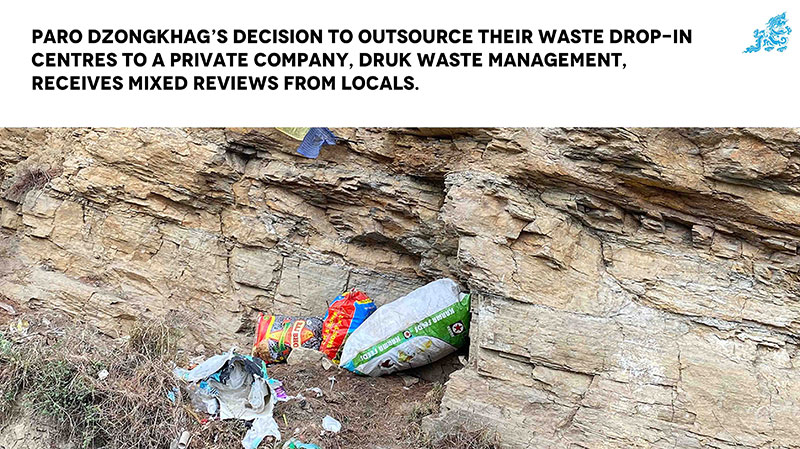Phub Dem | Paro
With mounting waste issues in Paro, the dzongkhag has outsourced its waste drop-in-centres to a private enterprise Druk Waste Management (DWM).
DWM manages Wangchang gewog waste drop-in-centre after collecting minimal fees from residents based on the quantity of waste.
While many people paid the fees, few raised questions.
A resident, Sonam, paid Nu 30 after disposing of dry waste. He said scraps piled up in his home, as the municipal truck did not collect the trash for three weeks.
He questioned how waste drop-in-centres could collect fees. “Where would people dispose of their waste?”
Sonam said he did not receive any directives from gewog or dzongkhag to pay fees for the waste. “Such practice might discourage people from disposing of their waste in the centres and force them to throw waste all over places.”
The dzongkhag and gewog administration officials said they did not authorise DWM to collect the fees.
Wangchang gup, Kuenzang Rinzin, said that after receiving complaints from people, he asked DWM to stop collecting the fees, as the gewog was already paying Nu 8000.
However, DWM officials said they were facing challenges in managing waste at the centres.
Chief executive officer of DWM, Ugyen Dorji, says he pays Nu 9500 to the caretaker, who cleans and manages waste segregation starting 7 am to 10 pm besides dumping the centre every two days a week.
He said that commercial establishments such as grocery stores, garment stores, processing units dump truckloads of unmanageable waste in the small centre. “We do not make any profit from the fee but collect it to make people realise how difficult it is to manage waste.”
With no scrap business and other sources of income, he said that it was challenging to meet the expenditure.
The volunteers from Paro College of Education help DWM collect and clean the drop-in centres during weekends.
With the closure of the municipal drop-in centre at the heart of Paro town, Ugyen Dorji said that waste at the Wangchang drop-in centre increased by three folds.
The caretaker, Phul Muti Rai, said that although she stayed until 10 pm, some people sneak around late into the night to throw waste all over the place. “Some people throw waste without paying. If the dzongkhag construct a fence, it will be helpful.”
The dzongkhag’s deputy chief environment officer, Ngawang Dorji, proposed collecting fees and increasing the annual waste management budget in gewogs from Nu 60,000 to Nu 120,000 in the recent dzongkhag tshogdu (DT).
The DT resolved to call for a multisectoral deliberation to put things into a larger perspective.
Ngawang Dorji said that the drop-in centre in Wangchang gewog was constructed to cater to household waste for office goers and those who miss the municipal trucks.
But he said that commercial establishments were disposing of waste in the centre. “We were supposed to dump the waste from the drop-in centre once a week, but we have to do it every two days due to huge waste.”
Ngawang Dorji said lack of human resources and finance were issues in managing the waste.
He said that DWM could collect fees after getting approval from the gewog tshogdu or DT.
Without constant monitoring and a proper strategy, waste management will remain a considerable challenge for Paro.
Sacks filled with wastes are thrown along the roadside, in gardens and along the viewpoints. The municipal waste collection truck is irregular.
The lone landfill at Pangbisa is filled to its brim, and every space available is dug to accommodate the increasing unsegregated waste.
It has been two years since the dzongkhag has been waiting for approval from the National Environment Commission to relocate the landfill.


